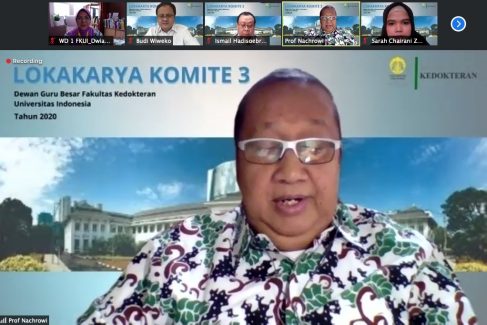Liberating UI Lecturers to Increase Their Productivity
By Prof. Nachrowi Djalal Nachrowi, Ph.D.
DEPOK – (31/8/2020) Prof. Nachrowi Djalal Nachrowi, Ph.D., Chairperson of the Academic Senate of Universitas Indonesia (SA UI) who is also Chairman of the Indonesian Council of Academic Senates of State Universities as Legal Entities (Majelis Senat Akademik Perguruan Tinggi Negeri Badan Hukum se Indonesia, MSA PTNBH) gave a presentation in a workshop held by the Council of Professors, Faculty of Medicine, Universitas Indonesia (DGB FKUI), in Jakarta on 31 August.
The workshop was held to gather input/proposals from speakers and participants on how to accommodate researchers at the Indonesian Medical and Research Institute at FKUI (IMERI FKUI) into UI’s academic organizational structure. IMERI researchers don’t find working as full time researchers at IMERI rewarding because of a lack of a promising career path and clear status as UI employees.
Following is the presentation:
According to Oswald (2015), a researcher at the University of Warwick, England, a happy work environment makes people more productive. The reverse is also true. A team that performs its job because it feels the pressure to do so and is under emotional strain will show low productivity.
The question is whether all UI’s academic members (lecturers and students) enjoy a happy environment to honor the Three Pillars of Higher Education. If not, their productivity is not optimal and should be improved.
The fact is, like it or not, all UI lecturers should honor the Three Pillars of Higher Education comprising education, research and community service. The Ministry of Education and Culture expects all lecturers in Indonesia to become super humans who can perform the three functions perfectly. Lecturers are evaluated routinely based on the standards set by the Directorate General of Higher Education to determine their performance level regarding the three pillars.
Based on my experience as an UI lecturer of more than 40 years, whether you admit it or not, there are lecturers who are excellent in the classroom but give average performance as researchers. On the other hand, there are lecturers who give average performance in the classroom but produce outstanding research results. These facts make us realize that lecturers have different passions and should therefore be given different tasks based on their passion and strong points. Therefore, lecturers should be evaluated using different standards based on their main tasks. If this is implemented, according to Oswald, the productivity of UI lecturers will improve.
Ideally, lecturers with a passion for research are tasked with research activity with additional tasks of teaching and community service. On the other hand, lecturers who are passionate about teaching should be given teaching job as the main task with research and community service as additional tasks. As a consequence, lecturers whose main task is research should be evaluated based on their research results while lecturers whose main task is teaching should be evaluated based on their teaching performance. By giving lecturers freedom to choose their main task based on their passion, every lecturer will enjoy their task and when that happens, their productivity will increase.
It is clear from the above discussion that UI needs research lecturers whose main task is to conduct research and teaching-intensive lecturers whose main task is teaching. When expanded, this grouping of lecturers can accommodate our colleagues, the researchers at LPEM, LD and LM at FEB UI and at IMERI at FKUI, as well as researchers at other research institutions within UI. These researchers can be classified as research lecturers, thus ensuring a clear employement status. However, research lecturers should honor the Three Pillars of Higher Education and their evaluation should focus on their achievement as researchers in addition to their additional tasks. Although their main task is to conduct research, they should be given an additional task of teaching to disseminate their research results in the classroom. They should also disseminate their research results to a wider audience as part of their community service activity.
As universities fall under the jurisdiction of the Ministry of Education and Culture, the career paths of the two groups of lecturers (at least in the short term) follow the ministry’s career pathing. However, universities should propose a review of the evaluation of achievements related to the Three Pillars of Higher Education to make it more flexible based on the key task of each lecturer. MSA PTNBH has proposed a review of the evaluation system with no results so far. In the long term, the career path of research lecturers can follow the career pathing designed by the Ministry of Research and Technology/National Agency for Research and Innovation. This calls for a mutual agreement between the Ministry of Education and Culture and the Ministry of Research and Technology/National Agency for Research and Innovation.
That concludes my proposal or thought about the importance of liberating UI lecturers and of accommodating researchers at UI’s research institutes. (hjtp)
(lem)



